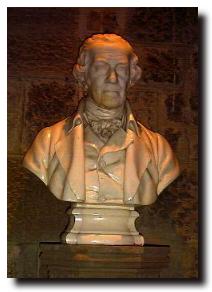
Born in Greenock, overlooking the Firth of Clyde, Watt suffered from poor health and did not attend school regularly. Instead, he spent time in his father's workshop, learning engineering skills and making models. He trained as an instrument maker and in 1757 obtained a post at Glasgow University.
In 1767 he repaired a Newcomen steam engine and he then identified how to improve the efficiency of this machine while out walking. But as it was a Sunday, and the strictures against working on the Sabbath were still very prevalent, he had to wait till the next day before he could write it down. His idea was to separate the condenser from the cylinder and enclose the cylinder in a steam jacket. Although Watt patented his idea, his early business had production problems and he sold the patent to a Birmingham entrepreneur, Mathew Boulton, and went into partnership with him. This proved to be highly successful and Watt retired a wealthy man in 1800.
Watt never stopped inventing right up to his death and he created a steam locomotive, a chemical document copier, advised Josiah Wedgewood on pottery processes, surveyed the Caledonian and Forth and Clyde Canals and deepened both the rivers Clyde and Forth. He also gave his name to the Watt unit of power and introduced the term "horsepower". But it is Watt's development of the steam engine, which was the springboard for the Industrial Revolution, for which he is rightly famous.



